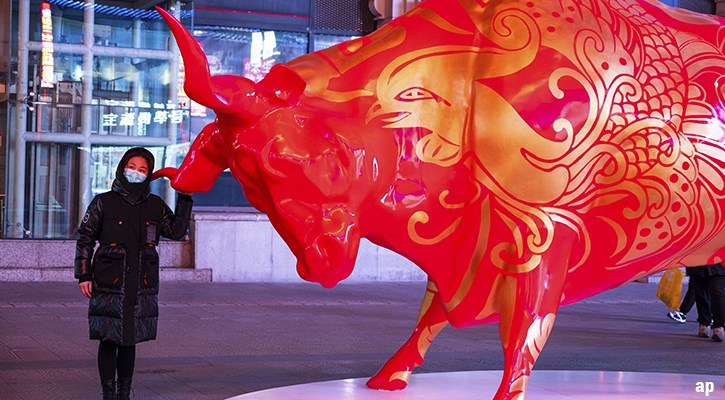
The Chinese electric vehicle market is exploding with local automakers clocking staggering sales figures. In 2023, Chinese EV maker BYD sold 1.57 million electric vehicles, up 73% from 2022, leapfrogging Tesla to become the world’s biggest electric car company. These numbers don’t include another 1.44 million hybrids BYD sold for the same period.
Sensing a monumental opportunity, Chinese smartphone maker Xiaomi recently jumped into the fray with the announcement of its first electric car.“We see rapid new energy vehicle, or NEV, adoption in China, stimulated by regulatory push and improving charging infrastructure, among others,” says Vincent Sun, equity analyst at Morningstar.
By 2025, NEVs are projected to account for more than 40% of total passenger car sales, up from 16% in 2021. Opportunistic investors looking to play the burgeoning Chinese EV market may want to look at these U.S.-listed names in the Morningstar coverage universe.
Li Auto is a leading Chinese NEV maker. It sold over 133,000 NEVs in 2022, accounting for about 2% of China's passenger new energy vehicle market. The company plans to expand its offerings to include BEVs and plug-in hybrid vehicles (PHEVs), to target a broader consumer base.
Li Auto’s monthly deliveries soared to record highs in 2023, clocking 182% year over year growth. The company plans to roll out its first purely battery-powered vehicle, MEGA, in March, it recently announced.
The automaker is well placed to benefit from “rapid new energy vehicle, or NEV, adoption in China, stimulated by regulatory push and improving charging infrastructure, among others,” says a Morningstar equity report.
Li Auto is expected to continue to gain market share from legacy automakers, boosted by the industry electrification trend and increasing consumer adoption of NEVs. Sun pegs the stock’s fair value at US$39.10 per ADS, in anticipation of “rising demand for the company’s NEV models and improving profitability on economies of scale over the next few years.”
He forecasts the automaker’s sell 624,000 units in 2025, from 133,246 units in 2022, taking about 5% share in the passenger NEV market by volume.
“We forecast an improved outlook for vehicle sales profit due to increased vehicle deliveries and lower unit production cost,” says Sun, adding that a positive long-term profitability outlook for Li Auto’s vehicle segment could lead to the first profitable year in 2023.
A major EV player in the Chinese automobiles market, BYD (U.S. listed ADR: BYDDY) has turned a pure-play NEVs maker since shuttering the production of combustion engine vehicles in 2022. The company sold more than 1.8 million passenger cars in 2022, about 28% of the Chinese passenger NEV market.
Once dismissed by Elon Musk as a Tesla competitor, BYD exceeded three million new energy vehicle productions in 2023, zooming past Tesla's output for the second consecutive year.
The Chinese EV maker has come a long way over the past 25 years, starting as a rechargeable battery supplier. It only entered the vehicle manufacturing industry in 2003.
“BYD is the largest new energy vehicle manufacturer in China in terms of sales volume,” says a Morningstar equity report.
The automaker targets the mass market through popular value-for-money models BEVs and PHEVs and has established strong brand equity, the report adds.
In 2022, the automobile and rechargeable battery segment accounted for 77% of the total revenue, while 23% came from another segment which includes the mobile handset components business (separately listed in Hong Kong as BYD Electronics).
“Riding on the rapid NEV adoption in China, we expect revenue contribution from the automobile business to rise to more than 80% by 2025,” says Sun, who pegs the stock’s fair value at HK$316, based on the expectation that the firm will continue gaining share in the NEV market from legacy automakers.
A prominent Chine EV name Nio, known for its focus on the premium segment, is set to launch a new mass-market brand in 2024. This strategic move aims to capture strong demand while preserving Nio's premium image. It sold over 122,000 EVs in 2022, accounting for about 2% of the China passenger NEV market.
“The company differentiates itself through continuous technological breakthroughs and innovations such as battery swapping and autonomous driving technologies,” says a Morningstar equity report.
The EV maker aims to build over 4,000 swap stations globally by 2025, about 1,000 of which will be outside China.
While the company hasn’t turned profitable yet, it will continue to improve its vehicle sales profit due to increased vehicle deliveries. “Riding on the vehicle electrification tailwind, we forecast Nio’s vehicle delivery to reach close to 300,000 units in 2025, from 122,486 units in 2022, taking 3% share in China’s passenger NEV market,” asserts Sun, who appraises the stock’s fair value at US$12.50 per ADS, anticipating Nio's continued market share gain over legacy automakers.
Nio has painstakingly crafted a premium brand image in China's midrange to high-end EV market. “The Nio brand is perceived by car owners as equivalent to the premium image of BMW and Mercedes-Benz in the internal combustion engine market,” notes Sun.





















